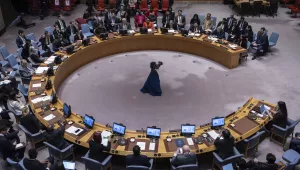The Pulitzer Prize–winning historian on strategy in the Obama era.
Pulitzer Prize–winning historian Fredrik Logevall says foreign policy realists who are critics of President Obama should take heart.
According to Logevall, Obama exercises a flexible "principled pragmatism" that gives American diplomacy and soft power a chance to reduce international tensions without resorting to questionable military solutions.
That approach might not please the critics who say Obama lacks a post-9/11 grand strategy comparable to containment during the Cold War. But the president’s ability to frame foreign policy concerns on a case-by-case basis “has much to recommend it,” Logevall said.
He is the author of Embers of War: The Fall of an Empire and the Making of America’s Vietnam, which won the Pulitzer for history in 2013. The book meticulously examines the rise and fall of French military and political fortunes in Indochina during the 1950s and the origins of America's deepening involvement in what becomes Vietnam after the devastating Battle of Dien Bien Phu.
Logevall, who is the Laurence D. Belfer Professor of International Affairs at Harvard University's John F. Kennedy School of Government, was the keynote speaker on May 13 during the Rethinking Grand Strategy Conference held at Oregon State University. The conference brought together an international panel of scholars to examine how the United States developed its grand strategy, how it operates and what grand strategy might become in the future, said Christopher McKnight Nichols, assistant professor of history at Oregon State University and director of the OSU Citizenship and Crisis Initiative.
In an interview with the National Interest, Logevall discussed why Obama really does have a grand strategy, why the United States faces fewer national security threats than many believe, how U.S. involvement in Iraq and Afghanistan mimics events during both the American and French phases of the Indochina Wars, and why American values are the nation's best guardians of U.S. national security instead of global dominance....
Continue reading: http://nationalinterest.org/feature/principled-pragmatism-fredrik-logevall-obamas-legacy-16312
Huard, Paul Richard. “Principled Pragmatism: Fredrik Logevall on Obama's Legacy.” The National Interest, May 23, 2016




